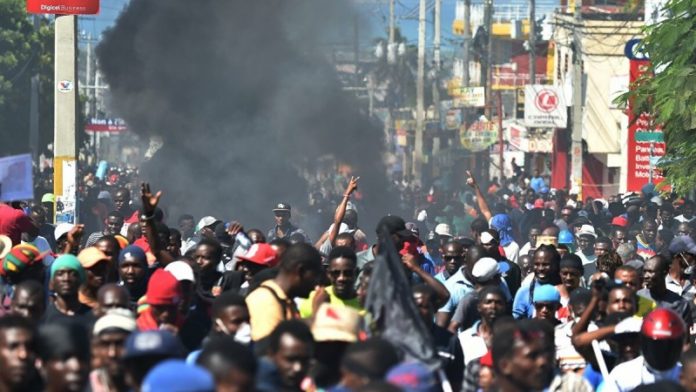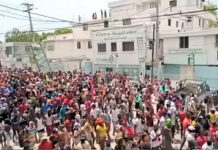
Do black lives in Haiti matter to the Canadian government? At the time of writing, Justin Trudeau continues to back the neo-Duvalierists who are currently subjugating that country’s impoverished masses, leading to a total loss of confidence in every sector of Haitian civil society.
Last Wed., May 27, the prime minister called President Jovenel Moïse and “underscored the strong friendship between Canada and Haiti.” This is the latest instance of diplomatic support by the Liberals for a repressive, corrupt and illegitimate president who has faced massive popular protests.
In April 2018 Trudeau met with Moïse at the Summit of the Americas, and later with Moïse’s prime minister, Jean-Henry Céant, in Ottawa in December 2018. According to the post-meeting readout, Trudeau “took the opportunity to convey his support for current efforts of the Haitian government to promote political dialogue.”
In January 2017 then foreign affairs minister Stéphane Dion and international development minister Marie-Claude Bibeau “warmly congratulated Jovenel Moïse on his election” and declared it “essential that the Haitian political actors respect the definitive results of the presidential election.” The only problem is, the president’s claim to legitimacy is paper thin. Moïse assumed the job through voter suppression and electoral fraud. Barely one in five eligible voters took part in the 2016 presidential election and, even according to official figures, Moïse only received 600,000 votes in a country of over 10 million. The president has gone on to siphon millions of dollars from government coffers while overseeing a corrupt and kleoptocratic administration.
Amidst mass protests, Canadian officials put out a stream of statements defending Moïse.
Amidst mass protests, Canadian officials put out a stream of statements defending Moïse. In November 2018 Bibeau declared a desire to “come to the aid” of the Haitian government. Three months later she attacked the popular revolt. When asked by Canadian French-language network TVA about Canada’s position on the issue, Bibeau responded, “the violence must stop; we will not come to a solution in this way.” This answer conveniently ignored that the violence was overwhelmingly meted out by the Canadian-backed regime.
What’s more, Canadian officials have all but ignored the ongoing violence of the Moïse regime. The day after Trudeau spoke with Moïse, United States Congresswoman Maxine Waters sent a letter to the U.S. ambassador in Haiti drawing attention to recent killings in the Port-au-Prince slum of Cité Soleil. On May 28, the Chair of the House Financial Services Committee wrote:
“I am especially disturbed by reports that a death squad headed by Jimmy Cherizier, commonly known as ‘Barbecue,’ accompanied by three Haitian National Police armored personnel carriers invaded Cité Soleil Tuesday, burning houses and killing people. This violent attack reportedly follows violent attacks in the impoverished Port-au-Prince neighborhoods of Tokyo, Delmas, and Pont-Rouge over the previous two days, in which police officers allied with Cherizier stood by while houses were burned, and people were killed. These reports, if true, represent an outrageous and appalling escalation of politically motivated violence against the people of Haiti.”
During the popular uprising between July 2018 and November 2019 the police killed dozens of people. Videos of police beating protesters, violently arresting individuals and firing live ammunition during protests circulated widely. Amidst a month-long general strike at the end of October 2019 Amnesty International reported that “during six weeks of anti-government protests … at least 35 people were killed, with national police implicated in many of the deaths.” A United Nations report confirmed government involvement in a massacre that left at least 26, and possibly as many as 71, dead in the Port-au-Prince neighborhood of La Saline in mid-November 2018. Residents said men in police uniforms began the killing. A year later 15 people were massacred in a nearby slum “in politically backed gang attacks intended to force residents of Bel-Air to remove protest barricades”, reported the Institute for Justice and Democracy in Haiti.
The Trudeau government has provided various forms of support to the repressive force that has maintained Moïse’s rule. Canadian police train their Haitian counterparts and Ottawa has paid for Haitian police buildings, vehicles, and other supplies.
Indeed, unbeknownst to many, the Liberals have supported the violent suppression of the popular will in Haiti, and the Trudeau government has continued a two-decade-old Canadian policy of undercutting Haitian democracy.
Yves Engler has been dubbed “one of the most important voices on the Canadian Left today” (Briarpatch). He has published nine books. This article was first published by Canadian Dimension.










